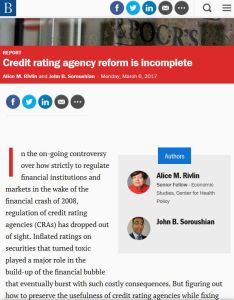Join getAbstract to access the summary!

Join getAbstract to access the summary!
Alice M. Rivlin and John B. Soroushian
Credit rating agency reform is incomplete
Brookings Institution, 2017
What's inside?
Credit rating agencies contributed to the 2008 financial crisis, yet rating reforms are still lacking.
Recommendation
This brief but important article from economist Alice M. Rivlin and analyst John B. Soroushian presents a unique slant on the flaws in the current credit rating system for traded securities, a little-discussed but critical topic, given the credit rating agencies’ outsized role in contributing to the 2008 financial crisis. getAbstract recommends this timely reminder of a crucial issue still pending resolution to fixed-income analysts, credit risk managers, economists and financial professionals.
Summary
About the Authors
Alice M. Rivlin is a senior fellow in economic studies and health care policy at the Brookings Institution. John B. Soroushian is a senior policy analyst at the Bipartisan Policy Center.


















Comment on this summary